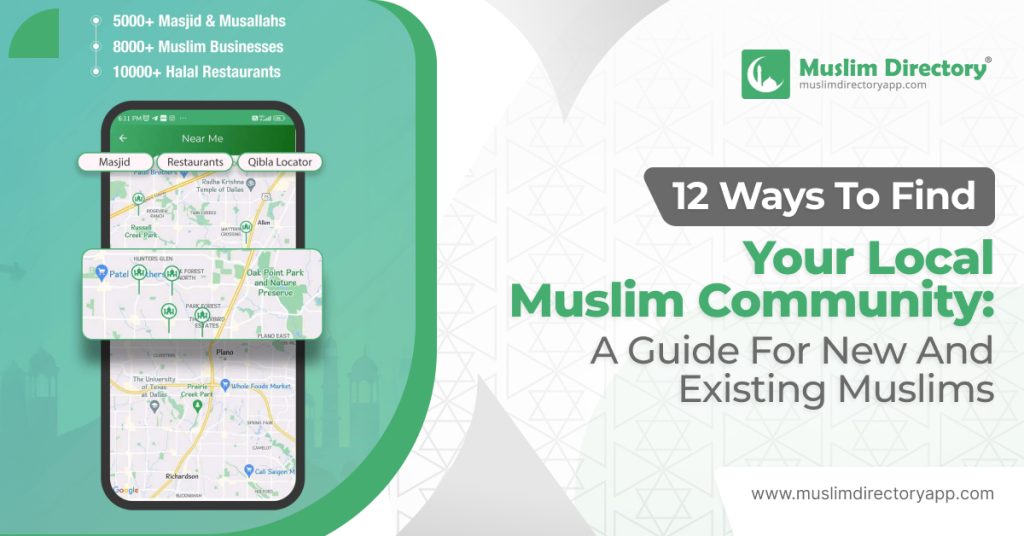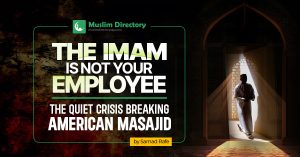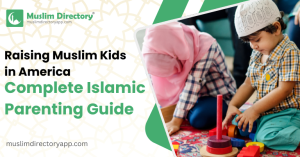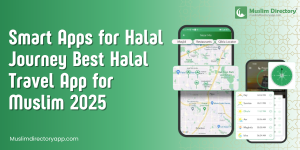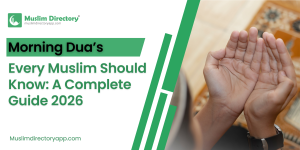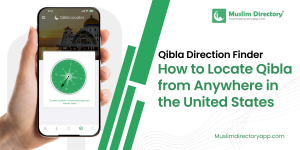In the modern world, it is vital to establish a strong relationship with the Muslim community in order to facilitate spiritual development, social support, and the preservation of Islamic rituals. The discovery of your local Muslim network has the potential to completely impact your Islamic journey, regardless of whether you are a new Muslim, have just relocated to a new location, or are simply trying to strengthen your community relationships.
Beyond the Friday prayers, there are many more advantages to establishing a connection with the Muslim community in your area. If you have a strong community, you will have access to spiritual direction, social support at difficult times, chances to network, and a feeling of belonging that will improve both your dunya (life in this world) and your akhirah (life in the hereafter).
1. Start with Your Nearest Mosque or Islamic Center
It is still the mosque that serves as the center of every Muslim community. In addition to their function as places of worship, mosques also play an important role as community centers, where friendships that last a lifetime and support networks are developed.
How to get involved:
- Attend Friday prayers (Jummah) regularly and introduce yourself to other congregants
- Participate in community dinners and social events hosted by the mosque
- Join mosque committees or volunteer for community service projects
- Attend educational programs, Quran study circles, and Islamic lectures
A large number of mosques provide a warm welcome to newcomers and have created initiatives that are expressly meant to assist new members of the community in integrating. In the case that you are interested in learning about forthcoming activities and chances to volunteer, do not be afraid to contact the imam or the community organizer after the prayers.
2. Use Muslim Directory Apps and Online Platforms
Technology has completely changed the way Muslims interact with the cultures they live in. These Islamic apps have long lists of Muslim owned businesses, services, and community groups in USA & Canada. You can download Muslim directory app.
Key features to look for:
- Local mosque and Islamic center listings with prayer times
- Halal restaurant and business directories
- Community event calendars and announcements
- User reviews and ratings for Islamic services
- Integration with prayer times and Qibla direction
Most of the time, these apps have community boards where Muslims in the area can share information about study groups, social events, and ways to help out. Many of them also have direct messaging tools that allow you to communicate with other app users who are nearby.
Download our Ads free mobile app to get access to entire directory.
3. Join Islamic Study Groups and Educational Programs
Islamic education strengthens both faith and knowledge, and it also fosters important connections among Muslims. Deep friendships can form in close-knit situations, such as those that occur in study groups.
Types of study groups to consider:
- Quran recitation and memorization circles (Halaqa)
- Hadith study groups focusing on prophetic traditions
- Islamic history and biography sessions
- Arabic language learning classes
- Fiqh (Islamic jurisprudence) study groups for practical Islamic law
Many study groups get together once a week in homes, mosques, or community centers. These smaller groups are great places to get to know other Muslims who share a dedication to learning and spiritual growth.
4. Attend Community Eid Celebrations and Islamic Events
The whole Muslim community tends to congregate during major Islamic holidays since they serve as inevitable meeting places. When these events take place, they often draw Muslims who would not normally attend activities at the mosque.
Major events to attend:
- Eid al-Fitr and Eid al-Adha community celebrations
- Ramadan iftar dinners and community breaking of fasts
- Mawlid al-Nabi (Prophet’s birthday) commemorations
- Fundraising dinners for local Islamic causes
- Cultural festivals celebrating Islamic heritage
In the context of your local Muslim community, these bigger gatherings provide a pleasant atmosphere in which people and families from a variety of backgrounds may connect and exchange information. The beginning of many friendships may be traced back to informal chats that take place at neighborhood potluck meals or Eid festivities for youngsters.
5. Connect Through Professional Muslim Networks
Networking with other Muslims in your field can help you make connections based on shared career goals and Islamic values.
Professional networking opportunities:
- Muslim professional groups that have chapters in your area
- Islamic finance and business networking groups
- Groups of Muslim health care workers
- Islamic groups for academics and lawyers
- Meetups for Muslim business owners and people who want to start their own businesses
These professional relationships can help you move up in your career, but they can also do more. They can help you make friends for life and find mentors who can help you in both your professional and spiritual life.
6. Participate in Community Service and Charity Work
Islam places a lot of importance on service (khidmah) and charity (sadaqah), which naturally brings people together around shared goals and values.
Community service opportunities:
- Volunteer at local food banks and homeless shelters.
- Participate in mosque-sponsored charity drives.
- Join disaster relief efforts organized by Islamic organizations.
- Volunteer for refugee resettlement programs.
- Participate in environmental cleanup projects.
Helping people in your community alongside other Muslims is a great way to meet new people and fulfill your Islamic duty to assist those in need. These times when we helped each other made strong connections.
7. Join Islamic Sports and Recreation Groups
According to Islamic principles, physical activity and recreation are enjoyable ways to make friends and maintain good health.
Recreational activities to explore:
- Muslim hiking and outdoor adventure groups
- Islamic sports leagues for basketball, soccer, and cricket
- Muslim family picnic and barbecue groups
- Community fitness classes held at Islamic centers
- Muslim book clubs and discussion groups
These events attract Muslims of all ages and backgrounds, providing them with an opportunity to make friends in a fun and relaxed setting. Many of these groups are family-friendly, making them excellent choices for parents who want their kids to meet new people.
8. Utilize Social Media and Online Muslim Communities
Digital platforms are great for finding and connecting with local Muslim communities, especially for younger Muslims and those who live in places with fewer Muslims.
Effective online strategies:
- Join Facebook groups specific to Muslims in your city or region.
- Follow the Instagram accounts of local Islamic organizations and businesses.
- Participate in WhatsApp groups for local Muslim communities.
- Use Meetup.com to find local Islamic gatherings and events.
- Connect with Muslim professionals in your area through LinkedIn.
Online connections are great places to start, but the goal should always be to transition to in-person relationships that can provide all the benefits of being part of a community.
9. Explore Islamic Businesses and Halal Establishments
Supporting Islamic businesses provides an opportunity for community members to connect with one another while adhering to Islamic principles of financial assistance to fellow Muslims.
Places to meet fellow Muslims:
- Halal restaurants and grocery stores
- Islamic bookstores and gift shops
- Muslim-owned service businesses
- Islamic financial institutions and credit unions
- Halal wedding venues and event planners
When people frequent these businesses often, they often interact with the owners and other customers, which creates natural opportunities for community building. Many Islamic business owners are well-connected within the local Muslim community and can make valuable introductions and offer sound suggestions.
10. Attend Islamic Conferences and Educational Events
Muslims from a wider range of places come to larger Islamic gatherings. This gives them the chance to meet people from the larger regional Muslim community, as well as those from their own area.
Events to consider:
- Annual Islamic conferences and conventions
- Scholar visits and special lecture series
- Interfaith dialogue events featuring Muslim speakers
- Islamic art and culture exhibitions
- Muslim youth camps and retreats
Networking sessions, community resource fairs, and social activities are common at these events. They are designed to help people from the same area get to know one another.
11. Connect Through Your Children’s Islamic Education
Parents often feel like they are part of a strong community when their children attend an Islamic school and participate in Islamic activities.
Family-oriented connection opportunities:
- Weekend Islamic schools and madrasas
- Muslim homeschooling cooperatives and support groups
- Islamic summer camps and youth programs
- Muslim Scouts and youth organization chapters
- Family-friendly mosque programs and events
These connections often go beyond parenting issues and turn into lifelong friendships based on shared values and helping each other raise Muslim children in societies where Muslims are not the majority.
12. Reach Out to Established Community Members for Guidance
Don’t underestimate the value of reaching out directly to established community members who can offer guidance and introductions to help you integrate more quickly.
Key people to connect with:
- Mosque imams and religious leaders
- Community organization presidents and board members
- Long-time community residents who know everyone
- Muslim community social workers and counselors
- Islamic school principals and teachers
These community leaders often have extensive connections and are eager to help newcomers find their place within the local Muslim community. A simple chat after prayers or a phone call to say hello can lead to many ways to connect with people.
Building Lasting Community Connections
Successfully integrating into your local Muslim community requires patience, consistency, and genuine interest in building relationships beyond surface-level interactions. Focus on quality connections rather than trying to meet everyone at once.
Tips for building lasting relationships:
- Be sure to go to community events and activities on a regular basis.
- Whenever possible, help and support people in your community.
- Share your skills and talents with others in the community.
- Be patient; trust and friendship will grow naturally over time.
- Stay in touch by talking to them and following up regularly.
Building a community is a two-way street, so you need to give and get help. People who are willing to give their time, talents, and resources for the good of all members are what make the strongest Muslim communities.
Overcoming Common Challenges
Many Muslims face similar challenges when trying to connect with their local community. Understanding these common obstacles and their solutions can help you navigate the process more successfully.
Common challenges and solutions:
- Language barriers: Seek out communities that accommodate your preferred language or join language exchange programs
- Cultural differences: Focus on shared Islamic values while respecting diverse cultural expressions
- Time constraints: Start with one regular commitment rather than trying to attend everything
- Social anxiety: Begin with smaller gatherings before attending larger community events
- Geographic distance: Use technology to stay connected between in-person meetings
The Long-Term Benefits of Community Connection
Connecting with the Muslim community in your area will help you and your family for many years to come. These relationships give you spiritual support when things are hard, help you celebrate when things go well, and give you practical help when you need it.
Strong community ties also benefit your kids by providing them with good role models, fostering a sense of connection to their culture, and offering them more people to turn to for help when needed. This helps them navigate problems while remaining true to their Islamic faith and values.
The time and money you spend on making connections in your community today will pay off for years to come. These connections will support you throughout your entire Islamic journey and strengthen the Muslim ummah, making it a more united community.
It’s not enough to simply meet people in your local Muslim community; you need to build relationships that will support your faith, enhance your life, and strengthen the entire Muslim community for future generations
